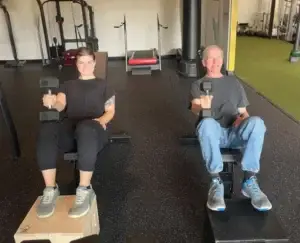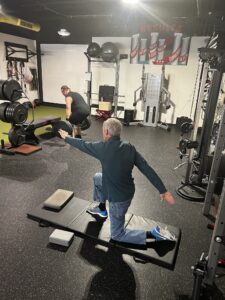These new weight loss drugs are turning out to be less detrimental than many of us in the health and fitness industry initially thought.
The primary concern was muscle loss, and not just that, but also the deterioration of ligaments, tendons, and BONES.
From what I’ve learned, when protein is prioritized and strength training is part of the plan, the benefits can actually outweigh the risks, especially for people struggling with conditions that make daily life debilitating (like severe obesity).
But here’s where things get unethical, in my professional opinion…
The Ads
These drugs are now being marketed to people my size, to people even smaller, and to people who are bigger but don’t actually have much to lose, especially not much muscle.

The woman in the blue dress was inquiring whether this weight-loss drug would be suitable for someone like her, who only wants to lose a couple of pounds.
The doctors in the ad said yes….
I’ve seen ads bragging:
“Lose 10 pounds without going to the gym or changing your diet!”
One even said:
“Cancel your gym membership, take our medication instead.”
😳
Let that sink in.
We already live in a society that’s losing muscle at a frightening rate.
Our ancestors lived more active lives filled with manual labor.
Today, our convenience-based lifestyle leads to less physical activity, more sedentary behavior, and a greater consumption of processed foods that fill us up but fail to provide the necessary nutrients to fuel our muscles and bones.
We’re the generation of people who are under-muscled and fragile, and when muscle is low, bone integrity is too. We don’t need a drug being misused that adds fuel to this epidemic.
The Trade-Offs No One Talks About
When we’re in our 20s, 30s, and 40s, most people aren’t thinking about what life will feel like in their 60s, 70s, or 80s. And if they do, they usually measure “health” by one thing: the number on the scale.
But a smaller body doesn’t automatically mean a healthier body, especially if that smaller body comes at the expense of muscle, and that dictates your metabolism. It’s not aging that slows your metabolism: it’s muscle loss and lack of activity.
As we age, our calorie needs decrease due to reduced physical activity and muscle loss. So, when people in their 40s and 50s say, “I’m gaining weight even though I’m eating the same as I always have,” that’s why.
Losing muscle has been a long-standing issue in our society, which has been getting worse; now imagine normalizing an appetite suppressant on top of that…
The rate at which people will experience muscle loss will accelerate, meaning their bodies now require even fewer calories to maintain themselves.
And now these drugs are making it possible for people to keep up with their low-calorie needs.
But is it worth it?
Temporarily, someone might fit into the dress they wanted to wear for the wedding, but where do they go from there?
They’ll end up having to keep restricting their diet as their muscle mass decreases; otherwise, the weight will come back, often even more than before. So, they either stay smaller or gain the weight back, but both outcomes leave them with little muscle mass, which over time leads to weaker bones if they’re not actively building strength and prioritizing protein.
The questions people should ask themselves are:
👉 Is it worth having a smaller body now if it means a frailer body later?
👉 Is it worth pushing off the habits that preserve muscle, bone, and independence just to see a smaller number on the scale and fit into smaller clothes?
What a frail body looks like in real life:
-
Struggling to keep up with your grandkids
-
Getting left behind on family trips
-
Skipping the hike on vacation
-
Missing out on events because you’re worried your body can’t handle it
-
Never dancing the night away at weddings or concerts
-
Feeling afraid to pick up the little ones in your family because of osteoporosis
-
Struggling to clean the whole house without pain or fatigue
-
Letting go of the active hobbies you once loved
-
Feeling isolated and doing less and less over time
When you’re nowhere near retirement and just trying to look and feel healthier, the things I listed above aren’t usually top of mind. That’s why I find it unethical when weight loss drugs are advertised as promising results without exercise or proper nutrition.
What I See Every Week
At our gym, we work with individuals in their 50s, 60s, 70s, and even 80s, helping them regain strength and independence. And yes, we turn things around for many of them. People who couldn’t get off the floor or walk a block now move with confidence.
But for every success story, there’s someone who doesn’t make it.
Someone who texts after a few sessions in to say they fell and broke a hip, had a heart attack, and then we never hear back from them.
Then there are the people who never make it in at all, the ones I talk to on the phone who are too frail, too unsteady, or too financially stretched to start. Many of them could live another decade, barely able to leave their house.
And that’s why I can say this with certainty:
Whether it’s through medication or sheer willpower on a crash diet, if weight loss comes at the cost of muscle loss, without a plan for strength training or proper nutrition, the trade-offs simply aren’t worth it.
Take it from someone who’s seen both sides: the people who preserved muscle and thrived, and those who didn’t and lost their independence far too soon.
There are no shortcuts to long-term health.
People might have different circumstances, more support, resources, or opportunities, but at the end of the day, even those with everything at their fingertips still have to do the work themselves.
Health isn’t something that can be achieved for you through medication or a procedure.
It’s something you build, slowly, through small habits and routines you can sustain over time.



